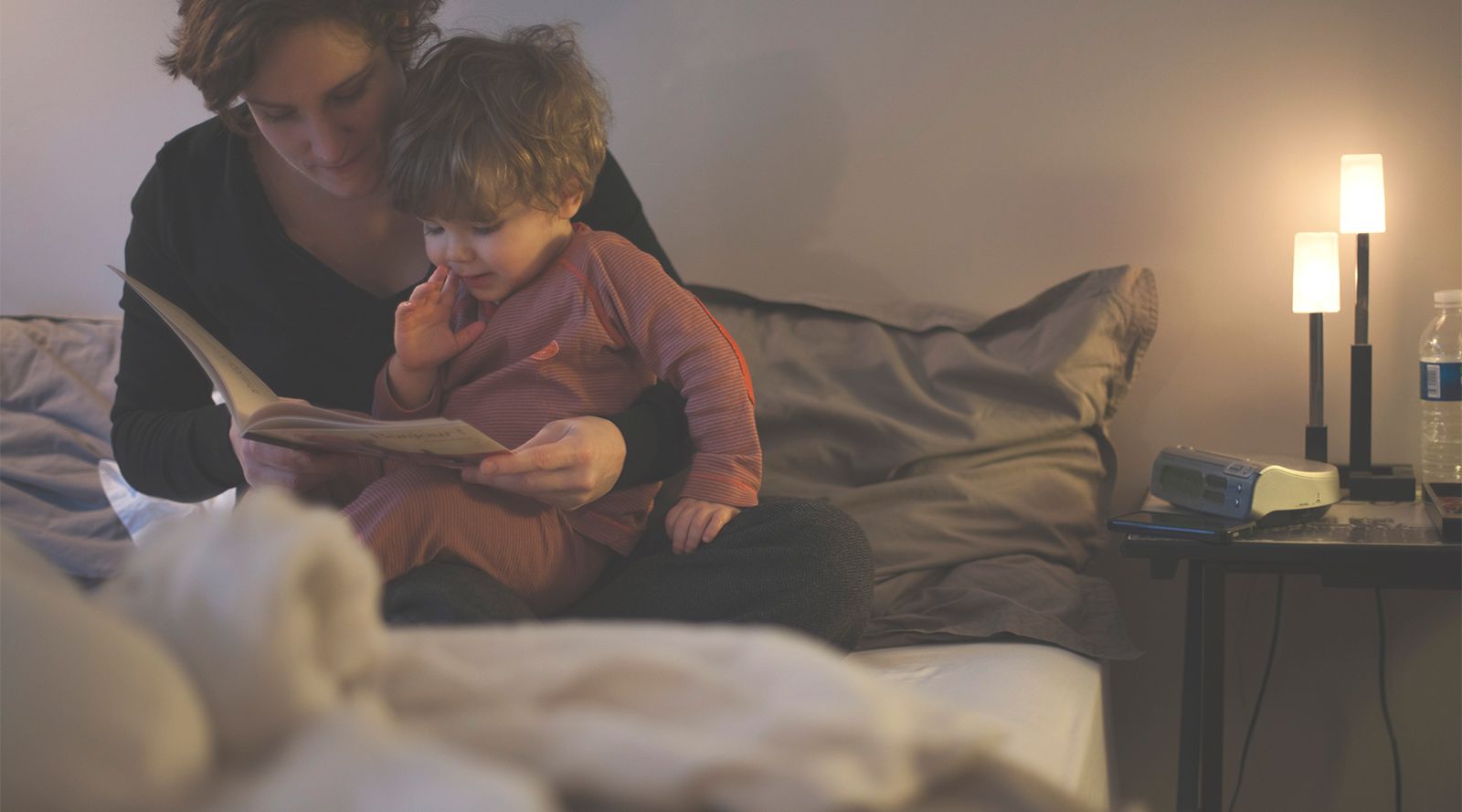At a glance
Toddlers need 12-14 hours of sleep to replenish their energy and grow
As they become more active and aware, getting toddlers to bed can be a challenge
Calming baths and bedtime stories can help establish a bedtime routine
Soothe night-time fears with cuddles, soft toys and a night light
Gazing at their peaceful little face, and listening to their adorable snoring, you can’t remember how getting them to sleep was so stressful. Until they wake up in the middle of the night demanding milk, a story and to be tucked in properly for the umpteeth time. Then you remember all too well.
Sleep problems in toddlers
While you may be able to function on six hours sleep, toddlers need around 12 to 14. Making sure they get that sleep, however, can be tricky. Toddlers not sleeping enough or waking up at night are common issues but try not to worry. It takes time and patience to establish a routine that ensures they’re getting enough shut-eye.
Some common sleep problems in toddlers are:
- The transition to a bed, rather than a cot with bars. Getting out by themselves is a new skill and they’ll love practising it.
- Not wanting to go to bed at all, in case they miss out on something amazing (even if it’s just you, relaxing on the sofa).
- Nightmares. The first time your toddler has one can be scary for both of you. Rest assured – it’s a sign that their imagination is developing.
Step-by-step: getting your toddler to sleep
Remember every child is different and what works for one won’t necessarily work for another, even if it’s a sibling. Every parent is also different, so if you don’t like routine, that’s OK too these tips can still help you.
Things to consider for a toddler bedtime routine:
Regular bedtimes and naptimes
Help them develop their own little body clock so sleep comes naturally. Try putting them to bed at the same time each night.
A bath and bedtime story
These can help you both unwind at the end of the day. Make sure you enjoy reading the stories as much as they love hearing them. You will both learn them off by heart, guaranteed.
Choosing a toy or book
It can help if they feel in control, so let them choose their bedtime toy or story. A familiar toy will comfort them as they start to drift off.
Gradual retreat
If they need you in the room as they start to nod off, each night gradually move towards the door a little more until you’re out and they’re fast asleep too. This can take a few weeks, so be patient.
Let them be
If they cry when you put them down, stay calm and comfort them. Resist the temptation to pick them up or bring them downstairs or else they might expect it every time.
Try a snack
Fight off any bedtime hunger pangs with a light snack (a small banana, a plain biscuit or milk) before they brush their teeth and go to bed.
Turn on the light
Try a nightlight, or leave their door ajar to help soothe any fear of the dark.
Keep them comfortable
Cuddles and reassurance should help with any fears or bad dreams and don’t forget to adjust their bedclothes to suit the temperature in their room.
Of course, if you’re worried about their lack of sleep (or yours), seek a healthcare professional’s advice.
Toddler waking up at night
So, your toddler went from sleeping beautifully all the way through, to waking up at all hours? Don’t panic, your toddler’s still learning how to sleep. That might sound odd, but remember they’re growing a lot, and this means their little bodies are constantly changing, which can affect their sleep.
Their imagination is developing which can lead to nightmares. Their teeth are pushing down and could be causing pain and discomfort. Plus, all that growing can make a little person hungry at any time!
Here’s a few ways to tackle some of the issues causing your toddler to wake up at night.
Overtiredness
It sounds odd, but if your toddler’s refusing to sleep or going to bed too late, they can actually struggle to sleep simply because they’re exhausted. Often the solution is putting them to bed earlier, before they hit exhaustion point. If they’ve already dropped their nap, you could try and create a chill-out time so they can unwind and relax.
Not tired enough
Hot on the heels of being overtired is not being tired enough. The clue is in the mood: an overtired toddler is usually grumpy, while one who’s not tired enough is bright and energetic. Consider cutting naptime down to 20 minutes or incorporating at least 30 minutes of energetic play towards the end of the day.
Separation anxiety
Remember you and your toddler were almost literally joined at the hip a short while ago? It can take time for them to adjust to being without you at bedtime. Pop in often for cuddles and kisses but resist the temptation to pick them up and take them out of bed. Try the gradual retreat method mentioned above.
Life changes
Moving house, potty training, arrival of a new sibling, starting nursery. All these events are huge for your toddler and unsurprisingly can cause them a lot of worry. Following their usual bedtime routine is even more crucial in these situations as it can be especially reassuring. There are quite a few storybooks about big life events that could also help put their mind at ease.
Nightmares
Nightmares in toddlers are perfectly normal and part of their healthy development. Again, reassurance is key and shows you’re taking their fears seriously. So avoid dismissing monsters-under-the-bed talk as silly and check under beds together. You can even help them make their very own monster-busting spray. Simply add a few drops of lavender to water in a plant mister and then spray their room together to destroy monsters before bedtime!
Big kid beds
This one is just a phase. It’s exciting being in a bed you can get in and out of all by yourself! Try to put them back into bed with as little fuss as possible and be prepared to do it several times a night to begin with. Their excitement will wear off eventually.
Hunger
Remember supper? Well the Victorians may have been on to something there, where growing toddlers are concerned anyway. Keep those hunger pangs at bay with a bowl of low-sugar cereal and milk before bedtime. The carb and protein combo also supports the release of tryptophan, an amino acid which causes sleepiness.
Screen time
Screen time is a sleep thief for toddlers and adults alike. Electronic devices emit a blue light that suppresses the production of melatonin, a chemical that tells the body when it’s time to sleep. Try to avoid screens for at least half an hour before bedtime.







